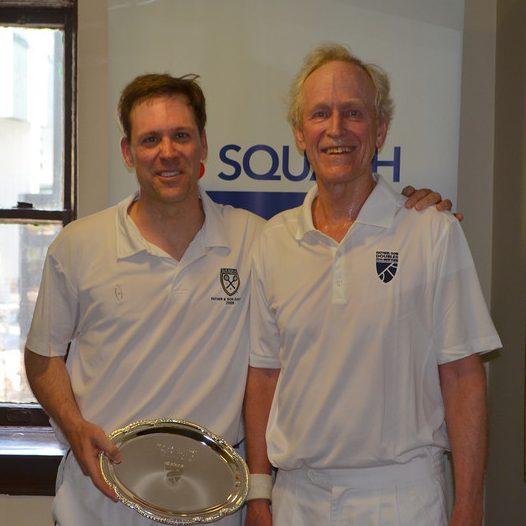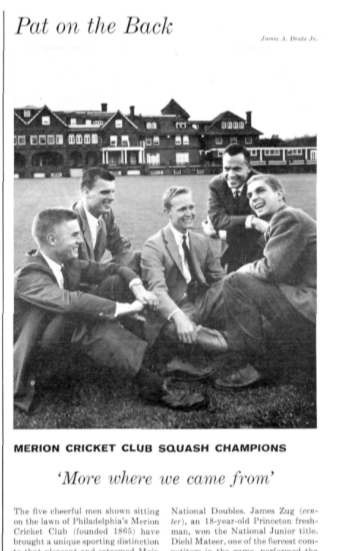
Jim Zug Sr. is a lifelong squash player and has won more than twenty National Squash Championships. He was Captain of the squash team at Episcopal Academy and later at Princeton University. He won his first title, the National Juniors, in 1959. Since then, his titles have included the National Doubles, Senior Singles, World Senior Doubles, Master’s Singles and Doubles, and the National Century Doubles, a father and son tournament. He has been featured three times in Sports Illustrated. He currently serves on the Board of Advisors for Squash Smarts. At 78 years old, Jim continues to play competitively.
Jim kindly spoke with Squash Universe by phone.
SU: How did you get started in squash?
JZ: My father played some, not a lot, and he took me over to the Merion Cricket Club when I was 12. I tooled around the place while he played and after he played his friendly game, he would hit some with me. I did that casually but actually I didn’t start playing seriously until Episcopal Academy in 9th grade when I was almost 15. Until then, I played mostly tennis. I picked up squash at school and switched from basketball to squash. I had some success with it that made me want to play more.
When I entered the National Juniors in 1959 in Pittsburgh, I was unseeded. I had never played in the National Juniors. There were good players from Canada, Pittsburgh and boarding school players. Three or four of the top players were from Philadelphia, most of whom I knew. I just happened to have a hot, relaxed, no expectation weekend and won the thing! So that was when I thought, hey, maybe I better take this sport a little more seriously. So that’s how I got started.
SU: Wow it is almost impossible now to start at 14 and be among the top players.
JZ: Yes – and there’s another big difference. We had a pro at the club who would try to encourage the juniors. He would throw his racquet in the back part of the court and say “I’ll give a Coke to any player who can hit my racquet on the second bounce in the back corner,” or things like that, but we never had clinics. They didn’t exist. There wasn’t any junior program and I never did any fitness training. Everybody just trained by playing. We didn’t do any weight training. I didn’t start the weight training until I was in my 50s and I started a stretching program when I had back troubles. But, back when I was playing, we just played and it was so much more casual and unstructured than it is today.
SU: You have clearly had a lifetime relationship with squash. What is it about the sport that makes you so passionate?
JZ: Initially, I loved the athletic part of the sport and loved the matches and the challenge of that – figuring out the strengths and weaknesses of an opponent, versus my strengths and weaknesses and thinking carefully about the strategy. I never had a coach to help with that but I always enjoyed that.
Back then, squash was a very social event. There was whole series of weekend tournaments for the amateur men and there were nice parties on Saturday night and you got to know everybody and their wives I really enjoyed the way it used to be.
SU: Did you ever take a break from squash for an extended period or feel burnt out?
JZ: No, I never felt burnt out but I did take breaks. I was transferred [for work] a bunch of times. I was transferred to Germany in 1973 and there were hardly any squash courts in Germany and so I didn’t play at all the entire years I was there. When I moved to Pittsburgh, there was squash in Pittsburgh but I lived 45 minutes away so I didn’t join the squash club or play for the five years I was there. So yes, there were breaks along the way.
SU: Describe your reaction to appearing in Sports Illustrated in 1959 while still a freshman at Princeton University.

JZ: Well, that was a nice pat on the back. Imagine that. I hadn’t done anything and suddenly there I was.
There was a funny aspect of that story. They took a picture of us at the finals of Nationals – Bob Hetherington, my opponent and myself, just the two of us, with the trophy on our racquets and our racquets holding up the trophy together. They put Bob Hetherington’s picture in “Faces in the Crowd” in Sports Illustrated so one of Philadelphia’s squash players wrote a letter to Sports Illustrated saying “the plug for Zug was the wrong mug” and the next week, they printed the correct photo of me.
I’ve been in Sports Illustrated a couple other times as well. Once was when I beat Hashim Khan in the first round. He was the defending champ in the US Open. Back then, the Open was the top eight pros and top eight amateurs in the U.S. I played him. I was unseeded and he was seeded number one. Friday night, the first round of the tournament and happened to outlast him in five games.
Then they put a classic photo of five members of Merion Cricket Club who all won the National Championships that year – junior, intercollegiate, U.S. Championship, U.S. Doubles and U.S. Open – all members of the same club – never happened before and it will never happen again. So that was in Sports Illustrated too.
SU: In what ways have you been involved in squash off the court?
JZ: I’ve been involved in various state associations where I’ve been and I’ve helped chair tournaments. Long ago, I chaired the Squash Committee at Merion Cricket Club and I’ve been a member of a global group of squash players called the Jesters Club, which is games with balls and walls so it includes racquets, court tennis, squash, Eton Fives and Rugby Fives in England. There are Jester groups in the U.S., Canada, UK, Australia, South Africa. We have toured and hosted tours. I’ve done a lot with the Jesters. We support the intercollegiate doubles tournament and various intercollegiate club matches for colleges that are just starting to field a club squash team. I was president of that at one point. I think when you love a game you want it to succeed and most of us help out as we can.
We hold round robins for eight teams in Atlanta, Cleveland, Chicago and maybe Detroit. The Jesters Club sponsors these and funds the teams’ costs while they are there for the matches.
SU: I know that you also work with urban squash programs.
JZ: Yes, I’ve been on the Board and Advisory Board of Squash Smarts in Philadelphia, the urban squash program there.
SU: Back to playing, I know you have played both hardball and softball. Which do you prefer and why?
JZ: I grew up with hardball to I just instinctively understand what the angle is to hit a cross-court nick deep in the back court, so I’m better at that. But I love softball nowadays for the exercise. There aren’t many geezers who play at the Merion Cricket Club so I play with some younger people or I play mostly doubles. But softball has a longer stroke, a different stroke. You have to adjust your stroke to the game. The angles are different, the strategy is different, and the shots are different so I play softball singles maybe five times a year, not much, but I do enjoy the exercise.
SU: Where would you like to see squash in the future?
JZ: Our immediate goal, which we have been working on for 20 years, is to get it to be an Olympic sport. A lot more recognition and funding for programs would come from that. I think there is a pretty good chance that that could happen with Los Angeles in 2024 but we’ll have to see. I think the U.S. Squash Association is doing a really good job. They just expanded a lot – the urban squash initiative has really caught on – it’s now in 20 some cities. The junior programs are very large and the intercollegiate programs have really expanded. U.S. Squash is doing a great job – for the extent they have funding, they really use it well to develop the game.
SU: What has squash meant to you beyond tournament wins and rankings?
JZ: I have a lot of friends in the sport mainly through the Jesters and Philadelphia. You play hardball your whole life, you know the players pretty well that you compete against. But beyond the tournaments, I think staying fit has helped in so many other ways. I’ve toured, been on U.S. Squash team that has toured England twice, South Africa once in 1984 during apartheid, which was fascinating, and Australia. So I’ve really had a wonderful life beyond tournaments.
SU: What have been some of your fondest memories playing squash?
JZ: I think my fondest memories are winning the National Father Son Century with my son – twice. [Jim’s son, James Zug, Jr, is an author and contributor to U.S. Squash Magazine, The New York Times, and Vanity Fair, among others.]
This is right up there with the most fun of all. You play squash, you play tournaments – that’s all what you’ve done – but to combine – we’ve played in it four times, lost in the finals twice but to be able to win it twice – not just once, but twice – that’s a special memory.
Having my son love the game as much as he does – it’s interesting – when he was a boy, we didn’t put any pressure on him to play squash at all. I was playing a lot and I won the National Doubles when he was probably 10 years old, so he was exposed to it, but he really didn’t take it up at all until he got to college. And then he got out of any feeling of any shadow of his father – which he probably felt growing up.
So he then took it up and was Captain of the college team. He played around in leagues and we happened to win the National Father Son Century. Then he started writing on squash. He’s written six books but one of the early ones was Squash: A History of the Game which is right up to the 1990s, so it is the whole history of hardball. He sold a lot of books and that publicized the sport a lot. Then he wrote the second book, Run to the Roar, about the Trinity College squash team and how Paul Assaiante coaches and how the players get ready to really focus and play their best and not be afraid. So, having my son involved in the sport is very gratifying too.